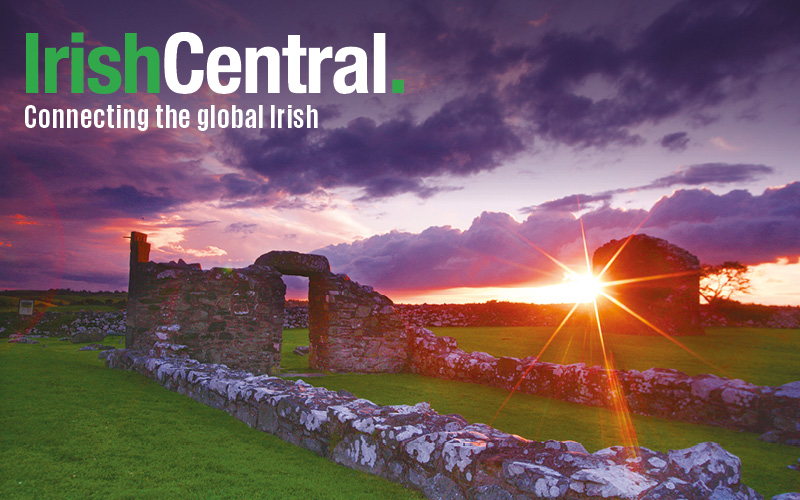In Dublin's Glasnevin Cemetery, there stands a monument to 17 men. Raised in 1966, on the 50th anniversary of the events of Easter Week, 1916, the monument honors 17 of the Irish Volunteers who died in the rebellion.
These 17 men were buried in a mass grave, along with 213 civilians who also perished during the Rising. There is no monument to these 213 men, women and children.
Although they also gave their lives for Irish freedom, they weren't given a choice about it.
“All of the others were ordinary men and women of Dublin. There’s a huge monument to the 17 volunteers who perished, erected in 1966, but there’s nothing for the others. They didn’t matter,” Glasnevin Trust chief executive George McCullough said.
“Those men gave their lives for Ireland. The civilians gave their lives for nothing.”
The civilian bodies, most belonging to the poorest of Dublin’s people, lay in City Hall for days as their families could not afford to bury them.
The 1966 commemorations forgot these people – the 262 civilians who died in the Rising – fifty-four percent of the total 485 total casualties.
1966 forgot the 40 innocent Irish children, the 18 Irish policemen and also, the 41 Irish soldiers in the British Army who died in the Rising.
All were Irish people with a life ahead of them, some with families left behind.
This time, we can do things differently.
As featured on IrishCentral yesterday, Niall O’Dowd complained at the manner in which this Rising commemoration will also speak of those who didn’t die a hero’s death in the fighting as an Irish Volunteer, or as I like to think of it, a commemoration that will finally accept we weren’t all rebels in 1916.
Because the vast majority of us are not descended from Irish rebels who took part in Easter Week. We’re descendants of the 140,000 who followed John Redmond’s split in the Irish Volunteers, supporting the British effort in World War One in the hope of achieving Home Rule. We’re descendants of those Dublin citizens who were angry at the rebels for the destruction of their city and the loss of innocent civilians. We’re descendants of those who played no part whatsoever in the Rising. In some cases, we’re even the descendants of those who fought against them.
I have already spoken for IrishCentral on the role of my great grand uncle William Mulraney in the Rising.
Born an Irish Catholic in Carrick Co. Kildare, Bill joined the Army at 18, as did his brothers Christie and Bernie, both of whom would die in a British uniform on foreign soil because of the promise of a job with good steady pay. A veteran of the Boer War, Bill retired from the Army upon returning from South Africa and went back to Kildare to work in the Timahoe area, playing football with the local GAA club and living with his wife and child.
At the outbreak of World War One, he was called back to the British Army as a reservist and sent on foreign service. A local Kildare historian, Seamus Cullen, told me of a letter he discovered from a friend of Bill’s, also from the Timahoe area and who served in WW1. Mere minutes before he attempted to visit Bill, he wrote in his letter, my uncle had been sent to the front.
Bill fought overseas in the war until suffering from gas poisoning while in Flanders and was sent to the Curragh Military Hospital in Kildare to recover. Medical professionals told him it would be some time before he could return to foreign duty.
By April 1916, however, he had recuperated well enough to be sent to Dublin on Easter Monday at the start of the Rising. He died from a gunshot wound two days later on April 26.
Since first telling this history, I’ve been surprised at the number of people in contact with me speaking of their own interest in telling my relative’s story and that’s mainly because the story is an interesting one. An Irish man, a football player, who fights as far away as South Africa and finds himself on the wrong side of history on home soil, to be vilified forever. A man reported by the Kildare Observer as being “ a very popular young fellow in the district in which he was known.”
To speak of this story and remember his role in 1916 is not to bend the knee to the British. It’s not some pathetic attempt at keeping everybody happy at the expense of the undoubtedly brave men who risked everything to bring us the Irish Republic. It’s not even an attempt to justify the actions of the British in Ireland.
The rebels and their leaders have the 2016 spotlight and deservedly so, but to talk of those who history has revealed to have chosen the now least popular or “wrong” path to independence would not belittle the rebels' actions.
It will only help us to remember that very normal people needlessly died in the conflict on both sides (or on no side at all) and that many Irish men joined the British Army at this time because they completely believed that in doing so they would further the Irish cause.
In mentioning the Republic’s commemoration of the “useless” Battle of The Somme, Niall sums up why we should be remembering these events in a way that does not glorify violence as 1966 did.
This year we have the opportunity to show the value of all the lives lost on either side and to further emphasize why we continue to work to completely remove acts of violence from Irish politics.
Only when we see these men not as monsters but as fathers and husbands who were just more fatalities of aggressive imperialism can we hope to forever leave the violence of Ireland’s past behind us.




Comments